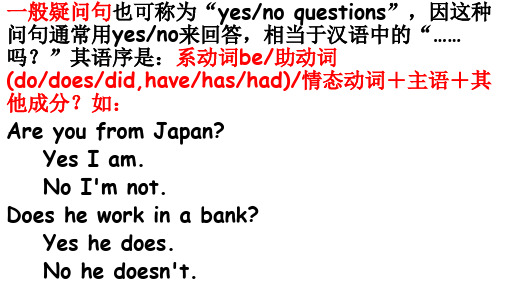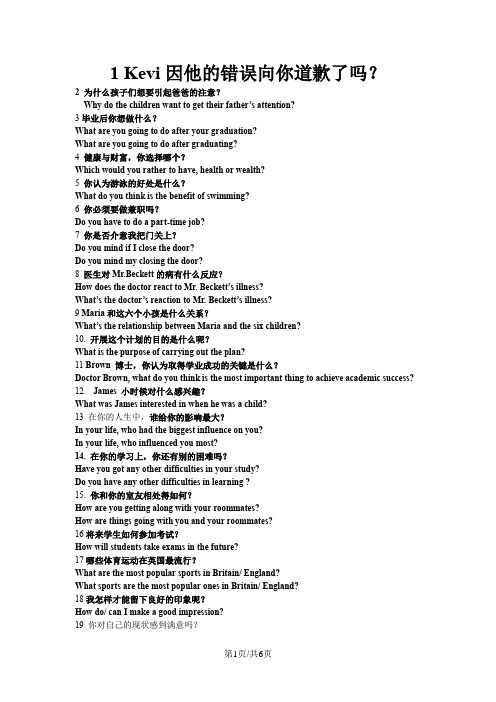翻译疑问句
初中英语翻译疑问句

初中英语翻译疑问句1) 陈述部分的主语是I,疑问部分要用aren't I.I'm as tall as your sister,aren't I?2) 陈述部分的谓语是wish,疑问部分要用may +主语。
I wish to have a word with you, may I?3) 陈述部分用no, nothing, nobody, never, few, seldom, hardly, rarely, little等否定含义的词时,疑问部分用肯定含义。
The Swede made no answer, did he / she?Some plants never blown (开花), do they ?4) 含有ought to 的反意疑问句,陈述部分是肯定的,疑问部分用shouldn't / oughtn't +主语。
He ought to know what to do, oughtn't he? / shouldn't he?5) 陈述部分有have to +v. (had to + v.),疑问部分常用don't +主语(didn't +主语)。
We have to get there at eight tomorrow, don't we?6) 陈述部分的谓语是used to 时,疑问部分用didn't +主语或usedn't +主语。
He used to take pictures there, didn't he? / usedn't he?7) 陈述部分有had better + v. 疑问句部分用hadn't you?You'd better read it by yourself, hadn't you?8) 陈述部分有would rather +v.,疑问部分多用wouldn't +主语。
疑问句怎么翻译

疑问句怎么翻译
疑问句的翻译不是固定的,它取决于所表达的具体问题和语境。
以下是一些常见的疑问句的翻译示例,供参考:
1. What is your name?(你叫什么名字?)
2. Where do you live?(你住在哪里?)
3. When is the meeting?(会议是什么时候?)
4. Why did you do that?(你为什么那样做?)
5. How can I help you?(我怎样才能帮助你?)
6. Can you speak English?(你会说英语吗?)
7. Would you like some tea?(你想要些茶吗?)
8. Have you finished your homework?(你完成作业了吗?)
9. Did you see the movie?(你看过这部电影吗?)
10. Are you feeling okay?(你感觉还好吗?)
以上只是一些简单的疑问句的翻译示例,具体的翻译方式还需要根据具体的语境和句子结构来决定。
疑问句翻译及答案

疑问句翻译一般疑问句be/助动词/情态动词+主语+其他成分?1.每天花那么多时间在电脑游戏方面有必要吗?、2.您能告诉我一些关于期中考试的事情?3.网上购物将会取代传统的购物方式吗?4.你是否拿了我放在桌面的钥匙?5.你是否知道这里禁止吸烟?6.你打算参加即将到来的运动会吗?7. 你还没有完成老师布置的作业?特殊疑问句特殊疑问词+be/助动词/情态动词+主语+其他what & which 8.这个男孩的妈妈年轻时喜欢干什么?9.当我们学习英语时,应该注意什么?10.吸烟对我们有什么影响?12. 谁将会做一个关于如何节约水电的讲座?\13. 你已经在这儿呆了多长时间了?选择疑问句结构:一般疑问句+or+其他成分14 你喜欢单独旅游还是和朋友一起出游?15 你将搭乘飞机还是火车离开?一般疑问句+疑问词+从句, (从句采用正常语序)16.你知道有多少人将来听这个演讲吗?17.您介意告诉我是谁负责这个部门吗?18.您能告诉我怎样才能联系上她吗?19 你能告诉我他何时将到国外进修吗?20 你明白李教授刚才所说的话吗?1. Is it necessary to spend so much time on computer games every day?2. Can you tell me something about the Mid-term exam?3. Will online shopping take the place of the traditional shopping?4. Did you take the key (which/ that was ) put on the table by me?5. Do you know that smoking is forbidden here?6. Are you going to take part in the coming sports meeting?7. Haven’t you finished the homework assigned by teacher (yet) ?8. What did the boy’s mother enjoy doing when she w as young?9. What should we pay attention to when we learn English?10. What effect does smoking have on us?11. Who will make a speech about how to save water and electricity?12. How long have you stayed here?13Do you like to travel alone or with your friends?14Will you leave by air or by train?15Would you mind telling me who is in charge of the department?16Could you tell me how I can get in touch with her?17 Can you tell me when he will go abroad for further education?18 Do you understand what professor Li said just now?。
文言文疑问句翻译

童子又问:“夫子,何以为教?”孔子对曰:“教也者,所以传道也。
传道者,使人明理,知义,行仁。
教之道,先正心,次修身,再齐家,终治国。
心不正,则理不明;身不修,则义不立;家不齐,则国不治。
”童子复问:“夫子,何以为政?”孔子曰:“政也者,所以理民也。
理民之道,先以德,次以法,终以刑。
德者,民心之所向;法者,国之所依;刑者,法之所不能及。
是以,善政者,民安其业,乐其生。
”童子再问:“夫子,何以为仁?”孔子答曰:“仁也者,爱人之心也。
爱人者,敬其亲,慈其子,信其友,和其乡,修其身。
亲亲而仁民,仁民而爱物。
是以,仁者,天下归之,而民乐其有。
”童子问:“夫子,何以为义?”孔子曰:“义也者,正道而行也。
正道而行,则身正而心清。
身正,则事功易成;心清,则邪念不生。
是以,义者,天下之准,而人共守之。
”童子又问:“夫子,何以为礼?”孔子曰:“礼也者,所以正身也。
正身之道,在敬。
敬者,礼之本也。
敬身,则心自正;正心,则事自顺。
是以,礼者,国家之仪,而民共遵之。
”童子再问:“夫子,何以为智?”孔子答曰:“智也者,知时而行也。
知时而行,则无过;无过,则事成。
是以,智者,天下之所贵,而人共尊之。
”童子问:“夫子,何以为信?”孔子曰:“信也者,言行一致也。
言行一致,则人信之;人信之,则事易成。
是以,信者,天下之宝,而人共守之。
”童子复问:“夫子,何以为勇?”孔子曰:“勇也者,临难不惧也。
临难不惧,则事无不成。
是以,勇者,天下之所敬,而人共仰之。
”童子问:“夫子,何以为诚?”孔子答曰:“诚也者,真实无伪也。
真实无伪,则人敬之;人敬之,则事无不成。
是以,诚者,天下之宝,而人共宝之。
”童子再问:“夫子,何以为节?”孔子曰:“节也者,制欲以正身也。
制欲以正身,则心自清;心自清,则事自顺。
是以,节者,国家之仪,而民共守之。
”童子问:“夫子,何以为和?”孔子曰:“和也者,和衷共济也。
和衷共济,则事无不成。
是以,和者,天下之贵,而人共贵之。
不同时态与语态在疑问句中翻译

(五)反意疑问句 1. 他们昨天没有扫扫教室,是吗? They didn’t clean the classroom yesterday, did they? 2. 你会来的,不是吗 You’re coming,aren’t you? 3. 约翰不喜欢茶,是吗? John doesn’t like tea,does he? 4. 她不会游泳,对吗? She can’t swim,can she?
பைடு நூலகம்
5. 你今晚有空吗? Will you be free tonight? 6. 你会打篮球吗? Can you play basketball? 7. 她扫除了吗? —Does she do the cleaning? 8.你到过那里吗? —Have you been there? 9.你不是史密斯先生吗? —Are you not Mr Smith? 10. 把她带到医院了吗? Has she been taken to hospital?
现在进行时: 1. 现在情况怎么样? How are things going? 2. 你怎么不穿大衣呢? Why aren't you wearing a coat? 3. 他们被警方盘问吗? Are they being questioned by police? 4. 这个案子正在调查吗? Is the case being investigated?
现在完成时: 1. 你的钥匙丢了吗? Have you lost your keys? 2. 你多长时间没见过她了? How long haven't you seen her? 3. 这个星期你收了多少封信? How many letters have you received this week? 4. 他们有没有被告知不要到那里游泳? Have they been warned not to swim there?
疑问句翻译

一般疑问句也可称为“yes/no questions”,因这种 问句通常用yes/no来回答,相当于汉语中的“…… 吗?”其语序是:系动词be/助动词 (do/does/did,have/has/had)/情态动词+主语+其 他成分?如: Are you from Japan? Yes I am. No I'm not. Does he work in a bank? Yes he does. No he doesn't.
特殊疑问句
结构:1.疑问词作主语,用陈述语序 2. 疑问词+一般疑问句, 特殊疑问词有what,who,where,when, which,whose,why, how,
如:who ate the apple? What did you say? Why do you tell me?
1.David开始在中国旅行了吗? Does David start travelling in China?
2.你正在在等谁呢? Who you waiting for?
3.你可以弹钢琴吗? Can you play the piano?
4. 你想看电影吗?
Do you want to see a movie? 5. 你将来会去上海工作吗? Will you work in Shanghai? 6.他怎么解决这个问题的?
疑问句翻译+作文范文

1 Kevi因他的错误向你道歉了吗?2 为什么孩子们想要引起爸爸的注意?Why do the children want to get their father’s attention?3毕业后你想做什么?What are you going to do after your graduation?What are you going to do after graduating?4 健康与财富,你选择哪个?Which would you rather to have, health or wealth?5 你认为游泳的好处是什么?What do you think is the benefit of swimming?6 你必须要做兼职吗?Do you have to do a part-time job?7 你是否介意我把门关上?Do you mind if I close the door?Do you mind my closing the door?8 医生对Mr.Beckett的病有什么反应?How does the doctor react to Mr. Beckett’s illness?What’s the doctor’s reaction to Mr. Beckett’s illness?9 Maria和这六个小孩是什么关系?What’s the relationship between Maria and the six children?10. 开展这个计划的目的是什么呢?What is the purpose of carrying out the plan?11 Brown 博士,你认为取得学业成功的关键是什么?Doctor Brown, what do you think is the most important thing to achieve academic success?12.James 小时候对什么感兴趣?What was James interested in when he was a child?13 在你的人生中,谁给你的影响最大?In your life, who had the biggest influence on you?In your life, who influenced you most?14. 在你的学习上,你还有别的困难吗?Have you got any other difficulties in your study?Do you have any other difficulties in learning ?15. 你和你的室友相处得如何?How are you getting along with your roommates?How are things going with you and your roommates?16将来学生如何参加考试?How will students take exams in the future?17哪些体育运动在英国最流行?What are the most popular sports in Britain/ England?What sports are the most popular ones in Britain/ England?18我怎样才能留下良好的印象呢?How do/ can I make a good impression?19 你对自己的现状感到满意吗?Are you satisfied with your current situation?20 虽然付出了努力,但是没有获得回报值得吗?Is it worthwhile that you make good efforts without any rewards?For you, Is it worth working hard without any rewards?21 你的目标是什么,获得成功还是学有所获?What’s the goal, achieving success or learning something?22 你可以想象女性在艰难的环境中是如何生孩子的吗?Can you imagine how the women give birth to babies in difficult conditions?23 当朋友处于困境中,如何让朋友振奋起来了?When your friends are in trouble, how do you cheer him/her up?24 用微信进行支付,给人们的生活带来了哪些便利?What convenience does We-chat pay bring people’s life?优秀作文分享(一)假如你是李华,计划和你班同学去参加某一社区组织的环保活动。
翻译疑问句

翻译疑问句1. What time is it now?现在几点了?2. Can you speak English?你会说英语吗?3. Where is the nearest hospital?最近的医院在哪里?4. How much does this cost?这个多少钱?5. Why did you do that?你为什么这样做?6. Do you know where he went?你知道他去了哪里吗?7. What is your favorite food?你最喜欢的食物是什么?8. Who is coming to the party tonight? 今晚谁要来参加派对?9. How far is it from here to the airport? 从这里到机场有多远?10. When will you be back?你什么时候回来?11. Are you sure about that?你对此确定吗?12. Are you busy right now?你现在忙吗?13. What's the weather like tomorrow?明天的天气怎样?14. Can you help me with this problem?你能帮我解决这个问题吗?15. Are you going to the concert tonight?你今晚要去音乐会吗?16. Have you seen my keys?你看到我的钥匙了吗?17. How long did it take you to finish the project?你完成这个项目花了多长时间?18. What did you think of the movie?你觉得那部电影怎么样?19. Can you recommend a good restaurant in this area? 你能推荐一家好的餐厅吗?20. Why are you late?你为什么迟到了?21. What are you doing this weekend?你这个周末打算做什么?22. How can I improve my English speaking skills?如何提高我的英语口语能力?23. Are you sure you understood the instructions?你确定你理解了指示吗?24. What's your opinion on the matter?你对这件事有什么意见?25. Is there any chance of getting a refund?有可能退款吗?26. Can you give me some directions to the nearest gas station? 可以告诉我去最近的加油站的路吗?27. Do you know what time the train leaves?你知道火车几点开吗?28. How often do you go to the gym?你多久去一次健身房?29. Can you please repeat that?你能再说一遍吗?30. What do you want to do for dinner?晚饭你想吃什么?31. Are you feeling okay?你感觉好吗?32. Can you explain that to me?你能解释给我听吗?33. What's the name of this song?这首歌叫什么名字?34. Are you going to the party tomorrow?你明天要去派对吗?35. Can you teach me how to cook this dish?你能教我如何烹饪这道菜吗?36. Why did you choose that color?你为什么选择那个颜色?37. What's the best way to learn a new language? 学习一门新语言最好的方法是什么?38. Can you lend me some money?你能借我一些钱吗?39. Why did you decide to study abroad?你为什么决定出国留学?40. What are your plans for the weekend? 你这个周末有什么计划?。
- 1、下载文档前请自行甄别文档内容的完整性,平台不提供额外的编辑、内容补充、找答案等附加服务。
- 2、"仅部分预览"的文档,不可在线预览部分如存在完整性等问题,可反馈申请退款(可完整预览的文档不适用该条件!)。
- 3、如文档侵犯您的权益,请联系客服反馈,我们会尽快为您处理(人工客服工作时间:9:00-18:30)。
翻译疑问句
一基本用法与结构
翻译疑问句主要由两部分组成:前一部分陈述句,后一部分简短的疑问句(陈述句+简单疑问句);第一部分提出看法,第二部分用来质疑或表示证实两部分的人称和时态要保持一致
原则:陈述部分为肯定式时,疑问部分用否定式
陈述部分为否定时,疑问部分用肯定
1.一般情况
You’re a student , aren’t you ?
Miss Xu is a nurse, isn’t she?(附加疑问句中的主语用主格)
He can speak English , can’t he ?
He came early, didn’t he ?
He likes English , doesn’t he ?
2.特殊情况
(a) 当陈述句部分含seldom hardly never few little barely (几乎不) scarcely (几乎不) rarely (很少) nothing 等否定词或半否定词,疑问部分用肯定式
He has few friends here , has he ?
She said nothing , did she ?
He can hardly swim , can he ?
They seldom come late, do they ?
(b) 若陈述部分含有带否定前缀un - dis - no 或者否定后缀less 等表示否定意义的词如unhappy dislike unfriendly 等,则看作肯定句处理,疑问句仍用否定式
The girl dislikes history, doesn’t she ?
It is unfair , isn’t it ?
He looks unhappy , doesn’t he ?
It is impossible, isn’t it ?
二、翻译疑问句的主句问题
1.基本原则:疑问部分的主语应与陈述部分主语一致,且只能是代词
Mary is a nurse ,isn’t she ?
2.当陈述部分为there be 句型时,疑问部分用there 作主语,即be +there
There was nothing in the room , was there ?
3.当陈述部分的主语是提示代词时,疑问部分用it they 等代词
That is a new car ,isn’t it ?
4.当陈述部分的主语是复合不定代词时,即somebody, someone ,everyone ,no one , nobody 等复合不定代词,其反意疑问句的主语在正式文体中用he , 在口语中用they Nobody was late , was he ?
当陈述部分的主语是something anything nothing everything 等不定代词时,反意疑问句主语用it
Everything is ready, isn’t it ?
Nothing is important , is it ?
三.陈述部分有have 的反意疑问句
1.当have 为助动词时,其反意疑问句用同样的助动词
He has already left,hasn’t he ?
2. 当have 为实意动词时,要分两种情况讨论
A.若表示所有,反意疑问句可以用have 也可以用do
He has a lot of friends here , hasn’t (doesn’t ) he ?
B. 若表示吃玩等意思,反意疑问句要用do
He has supper at 5 , doesn’t he?
He had a good time at the party, didn’t he ?
四.含情态动词的反意疑问句
1 基本原则:在通常情况下,当陈述部分含情态动词时,疑问部分会重复前面同样的情态动词
He can speak English , can’t he ?
We shouldn’t go, should we ?
2. 当陈述部分含有must 时,分情况讨论
A.若must 表示必须或有必要,疑问部分用mustn’t / needn’t
You must leave at once , mustn’t you ?
但陈述部分有mustn’t 表示禁止,疑问部分则要用must
You mustn’t laugh, must you ?
B. 若must 表示推测,疑问部分不能用must ,而应根据must 后的动词采用相应的动词形式
He must be tired , isn’t he ?
五.陈述部分为祈使句的反意疑问句
1 基本原则若陈述部分为祈使句,疑问部分通常用will you
Please help us, will you ?
Give me a hand , will you ?
Come with us , will you ?
Don’t forget to post the letter , will you ?
2.当祈使句为let’s 时,疑问句部分必须用shall we
Let’s go there together ,shall we ?
六.陈述部分为主从复合句的反意疑问句
1. 当陈述部分谓语为think (believe suppose expect imagine ) that 等时,疑问部分通常与从句主谓保持一致
I think that it is too short , isn’t it ?
(否定的后移)当这些动词后接的宾语从句的否定转移到主句时,其仍属于否定句,故后面的简短问句用肯定形式
I don’t believe that he can translate this book, can he?
I don’t think he will come , will he ?
(注) 这类用法主要限于主语为第一人称且think 等动词为一般现在时的情形
七.几种特殊情况的反意疑问句
1. I’m wrong , aren’t i ?
2. I wish to go with them , may I ?
3. 当陈述部分有had better 时,疑问部分用hadn’t
八反意疑问句回答
They work hard , don’t they ?
Yes , they do
They don’t work hard , do they ?
Yes they do .
He can speak English, c
an’
t
he?
(附加疑问句中的主语用主格)He came early, didn
’
t he?
(附加疑问句中的主语用主格)He likes English, doesn’t he
?
他喜欢英语,是吗?
(附加疑问句中的主语用主格)He d
oesn’t
like English, does he?
他不喜欢英语,是吗?
(附加疑问句中的主语用主格)。
